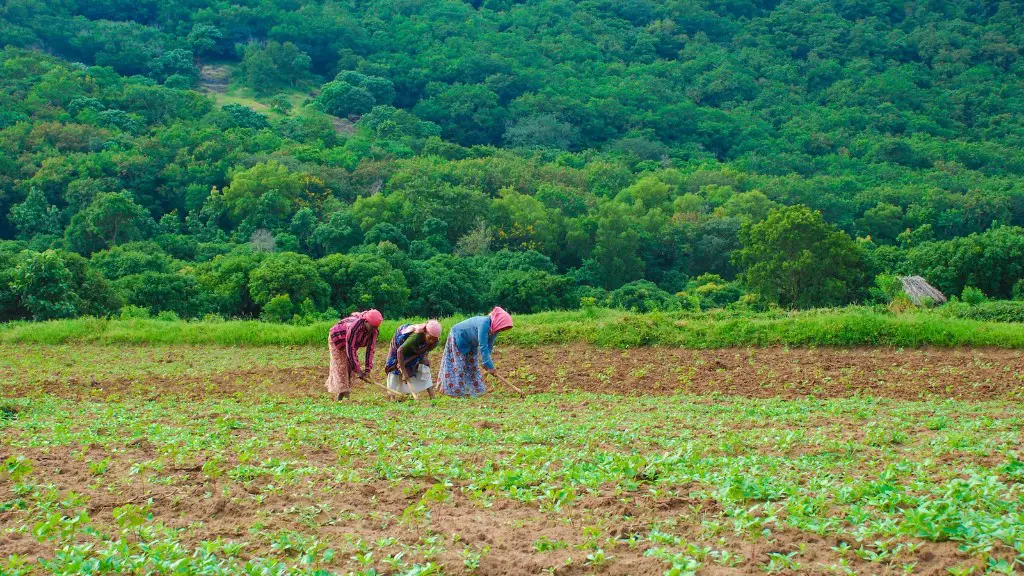An estimated 4-5 million undocumented immigrants are employed in the agriculture industry in the United States. This number represents approximately one-fifth of the total workforce in the US agricultural sector. The share of undocumented immigrants in agriculture has increased steadily since the mid-2000s, and they are now one of the fastest-growing groups in the agricultural industry. This presents both a challenge and an opportunity, as these individuals play a vital role in helping to meet the needs of our food production and distribution.
Uncontrolled immigration has long been a source of concern in the United States, and undocumented immigrants have typically been overlooked in government policy. This is regrettable, considering the important role that these individuals have in keeping our agricultural sector productive. A study conducted in 2020 found that the presence of undocumented workers is essential to maintain the economic viability of the American agricultural sector, and to adequately address the future labor needs.
A major challenge associated with undocumented immigration is the fact that these individuals are prohibited from engaging in any work activities in the US. This means that they are unable to access legal protections and benefits available to other workers, including access to healthcare and proper wages. There have been initiatives to address this, such as the expansion of the Deferred Action for Childhood Arrivals (DACA) program, which offers temporary legal status to certain undocumented immigrants.
Despite these challenges, there is no denying the fact that undocumented immigrants play an important role in advancing the agricultural industry. These individuals often possess vital skills and competences that are well-suited to farm work. The agricultural sector would struggle to provide adequate output without these laborers, many of whom are willing to work in hazardous environments or remote locations that others are unwilling to venture into.
In order to ensure the safety of both the workers and the communities in which they work, the US must implement measures that better secure the rights and opportunities of undocumented immigrants in agriculture. This includes creating an environment in which undocumented individuals have access to proper wages and other forms of protection such as healthcare and secure working environments. Unfortunately, there is still much progress to be made in this respect.
Effects of Undocumented Immigration on the Economy
The presence of undocumented workers in the agricultural industry has a wide-reaching effect on the US economy. According to a report by the Economic Policy Institute, undocumented workers are responsible for an estimated $12 billion in economic activity each year. This economic activity helps to drive domestic economic growth, and creates an indirect benefit to the industry. On the other hand, there is evidence that these workers have a detrimental impact on wages and working conditions due to their lack of legal recognition.
Furthermore, undocumented workers are generally unable to access the same level of employment rights and benefits as other employees. This means that they often receive lower wages and must work in substandard conditions. This has a negative impact on the agricultural industry, as it reduces the quality of output and increases the cost of production.
Undocumented workers also contribute to the US health care system in a number of ways. While they are ineligible for most forms of public assistance, they are still able to access emergency care through public health insurance. This is due to the fact that emergency care is provided irrespective of a patient’s citizenship status.
Despite their economic and health care contributions, undocumented immigrants are often subject to various forms of discrimination in the workplace. This includes low wages, dangerous working conditions, and limited opportunities for advancement. To ensure the safety and wellbeing of these individuals, employers must take steps to ensure that they are treated fairly and provided with appropriate legal protections.
Impact of Immigration on the Agriculture Sector
The presence of undocumented immigrants in agriculture plays a crucial role in helping to drive the sector’s growth and productivity. But these workers also present a challenge to the industry, as the lack of legal status makes them vulnerable to exploitation. As a result, it is essential that measures are taken to ensure that these individuals are provided with proper wages, benefits, and working conditions.
The agricultural industry relies heavily on the labor of undocumented individuals. This is especially important in sectors such as fruit and vegetable production and harvesting, which often require manual labor that is not feasible for many native-born workers. The presence of undocumented workers also allows US farmers to keep their labor costs low, as they are generally willing to work for a lower wage than native-born workers.
However, the reliance of the agricultural sector on undocumented immigrants also creates certain challenges. For instance, workers may be exploited or mistreated due to their lack of legal protection. Additionally, employers may be subject to legal penalties if they are found to be in violation of labor laws. To address these issues, the government must take action to ensure that employers adhere to the law and that undocumented immigrants are provided with the same protections and rights afforded to other employees.
It is also important to note that undocumented immigrants in the agricultural sector have a significant impact on the US economy. This is due to the fact that these workers generate economic activity and contribute to the income tax system, despite their legal status. For this reason, it is essential that measures are implemented to ensure that undocumented workers are provided with the same rights and opportunities afforded to other workers.
Legal Reality vs. Human Rights
Due to their undocumented status, undocumented immigrants in agriculture often face significant legal obstacles when it comes to their employment rights and opportunities. This is due to the fact that they are not afforded the same legal protections as other workers, and are often subject to exploitation or mistreatment. This has a significant impact on their ability to access the same level of wages and working conditions as other employees.
At the same time, undocumented immigrants should not be denied basic human rights. This includes the right to a safe working environment, fair wages, and proper healthcare. To ensure that these rights are upheld, the government must take action to strengthen the legal protections afforded to undocumented workers, and to penalize employers who violate the law.
In addition to strengthening legal protections, advocacy organizations and activists must also employ various forms of resistance in order to combat the exploitation of undocumented workers. This includes organizing protests and rallies, developing enforcement campaigns, and advocating for legislative change. By following these methods of resistance, it is possible to ensure that rights and opportunities for undocumented immigrants in the agricultural sector are preserved.
Conclusion
Undocumented immigrants play a crucial role in the US agricultural industry, and their presence is essential for the sector’s continued growth and productivity. However, due to their lack of legal recognition, these individuals face significant challenges when it comes to their employment rights. For this reason, the government must take measures to ensure that undocumented workers are provided with adequate wages and working conditions, and to protect them from exploitation. Additionally, advocacy organizations and activists must continue to fight for the rights of undocumented immigrants in the agricultural sector.




